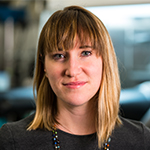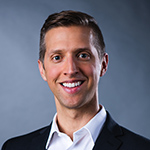Pennington, NJ – Betar M. Gallant, Yayuan Liu, Jacob S. Spendelow, and William Tarpeh received the 2022–2023 ECS Toyota Young Investigator Fellowships for projects in green energy technology. The fellowship program is a partnership between The Electrochemical Society and the Toyota Research Institute of North America (TRINA), a division of Toyota Motor Engineering & Manufacturing North America, Inc. (TEMA). Through this program, ECS and Toyota promote innovative and unconventional green energy technologies born from electrochemical research—and encourage young professionals and scholars to pursue battery and fuel cell research. This is the eighth year that the fellowships have been awarded. Since its inception, the program has awarded in excess of $1.4M in research funding to 28 young investigators (including the 2022–2023 recipients).
2022-2023 ECS Toyota Young Investigator Fellows
 Betar M. Gallant
Betar M. Gallant
Massachusetts Institute of Technology
“Correlating organic phase partitioning and Coulombic efficiency in the Li Solid Electrolyte Interphase”
Betar Gallant is Associate Professor in the Department of Mechanical Engineering and ABS Career Development Chair at the Massachusetts Institute of Technology (MIT). Her pioneering research methodologies illuminate fundamental insights into chemical dynamics and material properties at the solid electrolyte interphase of lithium and beyond-lithium metal anodes.
Professor Gallant completed her SB (2008) and SM (2010) in Mechanical Engineering at MIT. Over the summer of 2009, she worked as Energy Technology Program Specialist at the U.S. Department of Energy, co-developing the framework for the RE-ENERGYSE (Regaining our Energy Science and Engineering Edge) initiative to strengthen energy and STEM education in public schools. Prof. Gallant returned to MIT to complete her PhD (2013) with Yang Shao-Horn as advisor. Her postdoctoral research at the California Institute of Technology from 2013-2015 was co-advised by Nathan S. Lewis and Julia R. Greer. In 2016, she joined MIT as Assistant Professor in the Department of Mechanical Engineering and held the Esther and Harold E. Edgerton Career Development Chair until 2021 when she assumed her current position. Prof. Gallant received awards including the 2021 ECS Battery Division Early Career Award; 2021 NSF CAREER Award; 2020-2021 Scialog Fellow in Negative Emissions Science and 2019 in Advanced Energy Storage; 2019 Ruth and Joel Spira Award for Distinguished Teaching at MIT; 2019 Army Research Office Young Investigator Award; and 2016 MIT Bose Research Fellowship. The author of 50 articles (h-index 22), Prof. Gallant holds one patent granted with six applications pending. She is on the Early Career Advisory Board of Batteries & Supercaps and faculty advisor for the ECS MIT Student Chapter.
 Yayuan Liu
Yayuan Liu
Johns Hopkins University
“Redox-Tunable Lewis Bases for Electrochemical Carbon Capture”
Yayuan Liu is an Assistant Professor in the Department of Chemical and Biomolecular Engineering and an associate faculty member in the Department of Materials Science and Engineering at Johns Hopkins University. Her research group works on developing efficient, economical, and sustainable carbon capture technologies critically needed to tackle climate change. Her ECS Toyota Young Investigator Fellowship research focuses on developing redox-active Lewis base sorbents whose CO2 affinity can be modulated by applying electrochemical potentials to enable modular carbon capture systems using renewable electricity.
Prof. Liu earned her BS in Materials Science and Engineering in 2014 from Nanyang Technological University and received the Lee Kuan Yew Gold Medal for academic achievements. She completed a PhD in 2019 at Stanford University under the guidance of Prof. Yi Cui in the Department of Materials Science and Engineering, supported by the Stanford Graduate Fellowship. Prof. Liu completed her postdoctoral training at the Massachusetts Institute of Technology, working with Prof. T. Alan Hatton in the Department of Chemical Engineering. Her research garnered multiple awards including the American Chemical Society (ACS) Division of Inorganic Chemistry Young Investigator Award; Materials Research Society (MRS) Graduate Student Gold Award; and she was a Forbes “30 Under 30” Science honoree. The author of 70 articles (h-index 57), she holds three patents. She serves as Associate Editor for Materials Today Energy
 Jacob S. Spendelow
Jacob S. Spendelow
Los Alamos National Laboratory
“Coaxial Nanowire Electrodes for improved efficiency in water electrolyzers”
Jacob Spendelow is a Scientist at the Los Alamos National Laboratory (LANL). His research focuses on fundamental and applied electrochemical science associated with energy devices such as fuel cells and electrolyzers. This work has included analysis of electrocatalytic processes on model surfaces, development of novel catalysts and catalyst supports for oxygen reduction and oxygen evolution reactions, and design of improved electrode structures and transport media for fuel cells and electrolyzers.
Dr. Spendelow received a BS (2002) and MS (2003) in Chemical Engineering from Case Western Reserve University. He completed a PhD at the University of Illinois at Urbana-Champaign in 2006 with funding from a National Science Foundation Graduate Research Fellowship. Andrzej Wieckowski and Paul Kenis were his advisors. He joined LANL as a Director’s Postdoctoral Fellow in 2006 and became a staff member in 2008, working with the Fuel Cells Team. In addition to his research work, Dr. Spendelow served for several years as a science advisor and program manager at the Department of Energy Fuel Cell Technologies Office, where he managed R&D projects related to polymer electrolyte membranes, catalysts and supports, and reversible fuel cells. He is the recipient of the 2019 Hydrogen and Fuel Cell Technologies Office Annual Merit Review Fuel Cell R&D Award. The co-author of more than 40 technical publications (h-index 30) and one book chapter, he has two patent applications pending. Dr. Spendelow is a member of the U.S. Drive Fuel Cell Technical Team.
 William Tarpeh
William Tarpeh
Stanford University
“Enabling and implementing a sustainable circular economy using selective membranes”
William Tarpeh is an Assistant Professor of Chemical Engineering at Stanford University. The Tarpeh Lab develops and evaluates novel approaches to resource recovery from “waste” waters at several synergistic scales: molecular mechanisms of chemical transport and transformation; novel unit processes that increase resource efficiency; and systems-level assessments that identify optimization opportunities. His ECS Toyota Young Investigator project focuses on designing solute-selective membranes for lithium and other critical battery materials (e.g., nickel, cobalt).
Dr. Tarpeh completed his BS in Chemical Engineering at Stanford in 2018. His MS (2013) and PhD (2017) in Environmental Engineering at the University of California, Berkeley were supported by an NSF Graduate Research Fellowship, Ford Foundation Predoctoral Fellowship, and UC Berkeley Chancellor’s Fellowship. Kara Nelson supervised his PhD research. From 2017-2018, he conducted postdoctoral training at the University of Michigan in environmental engineering. He joined the faculty at Stanford in 2018. His research has garnered awards including the 2022 Dreyfus Foundation Teacher-Scholar Award. He is a member of the Bouchet Honor Society, and was included in the 2019 C&EN Talented 12; 2019 Environmental Science & Technology Letters Early Career Scientists list; 2019 Forbes “30 Under 30” Science List; and 2016 NBCBLK “28 Under 28” African-American Innovators. He is the author of 26 articles and three patents.
2022–2023 ECS Toyota Young Investigators Fellowships
The Fellows each receive a $50,000 grant to conduct the research outlined in their proposals and a one-year complimentary ECS membership. They submit a midway progress report to ECS and, after one year of funding, a final written report. TRINA invites them semiannually to present their research progress. Their findings are published open access in a relevant ECS journal, and within 24 months of the end of the research period, and presented at an ECS meeting. Toyota may choose to enter into a research agreement to continue working with the Fellows after their fellowship’s end.
2022–2023 ECS Toyota Young Investigators Fellowship Selection Committee
ECS gratefully acknowledges the service of the following ECS Toyota Young Investigator Fellowship Selection Committee members who reviewed 39 applications for the 2022–2023 program.
Toyota Research Institute of North America (TRINA)
- Timothy (Tim) Arthur, Principal Scientist, Materials Research Department
- Hongfei Jia, Senior Manager, Research, Lab M3
- Rana Mohtadi, Principal Scientist, TRINA
- Charles (Chip) Roberts, Principal Scientist, Toyota Motor North America R&D
- Ryuta Sugiura, Director, Material Research, Toyota North America
The Electrochemical Society
- Elizabeth Biddinger, The City College of New York
- John T. Vaughey, Argonne National Laboratory
- Gang Wu, University of Buffalo
2023-2024 fellowship cycle
The request for proposals for the next ECS Toyota Fellowship cycle opens in November 2022. The submission deadline is January 31, 2023. Candidate interviews take place in February and March of 2023. The Fellows’ names are announced in July/August 2023. Consult the ECS website for more information and to submit a proposal.
The Electrochemical Society
ECS has led the world in electrochemistry and solid state science and technology and allied subjects since 1902. We are a volunteer-directed international nonprofit professional society advancing scientific theory and practice by publishing cutting-edge research, hosting prestigious meetings, fostering training and education, and collaborating with other organizations. Our robust global membership develops innovative solutions to the planet’s major challenges. Scientists, engineers, and industry leaders share pioneering scientific developments, exchange ideas, network, and expand research horizons at ECS biannual, co-hosted, and sponsored meetings. The ECS Digital Library on IOPscience hosts highly peer-reviewed journal and magazine articles and meeting abstracts from our distinguished publications including the Journal of The Electrochemical Society (the oldest peer-reviewed journal in its field) and ECS Journal of Solid State Science and Technology. The Society supports open access throughout its publications, launching two new Gold Open Access journals, ECS Sensors and ECS Advances, in 2022.
Media Contact
The Electrochemical Society
Shannon Reed
Director of Community Relations
609.737.1902, Ext. 107
Shannon.Reed@electrochem.org

